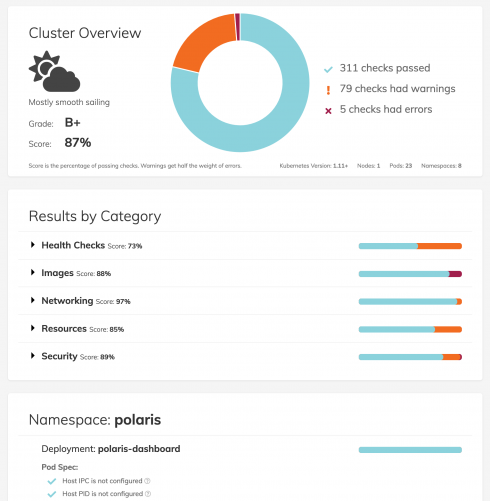
Cloud-native infrastructure solutions provider Fairwinds has announced a new open-source Kubernetes project, Polaris, designed to be a diagnostic tool that provides an overview of current deployments, keeps teams in sync, and ensures the stability, efficiency and security of a cluster.
“Keeping cloud-native environments healthy is a challenge. Even the smallest errors in Kubernetes deployment configurations can lead to major issues ranging from poor container performance to production outages and security breaches,” said Bill Ledingham, CEO at Fairwinds. “Polaris, built on a set of well-tested standards, provides an easy and fast way to identify configuration issues early, fix them, and prevent future problems.”
Polaris features a dashboard that runs a variety of health checks based on best practices and standards; an experimental validated webhook that prevents future configuration errors from being deployed; and the ability to audit local YAML files.
“Polaris is designed to ease this handoff between platform engineering teams and app development teams. We specifically targeted issues with app configuration that could lead to problems with scaling, stability, efficiency, and security. With every point you add to your Polaris score, you reduce your chances of experiencing an outage, security breach, or performance degradation,” the team wrote in a blog post.
In addition, the company announced Polaris Snapshot, a new capability that will enable users to generate a report from Polaris and share it with their team members.
“Once we finished Polaris, it came time to actually run it in our customer’s clusters. It was easy to set up a temporary dashboard before a meeting, but we didn’t want to leave an unnecessary process running in each customer’s environment, no matter how small and cheap it might be. And the fact that the report would change in response to new deployments could lead to miscommunication,” the team wrote in a post. “What we needed was a way to generate a one-off report, a snapshot of the cluster’s state at a particular point in time. This report could then be saved, passed around, and discussed as we set up a plan to prioritize and address the issues Polaris found.”
Going forward, the team plans to add capabilities that will bring Polaris beyond just deployments, such as support for StatefulSets, Jobs, CronJobs and DaemonSets. The team also revealed plans for support for exemptions and new ways to enable users to create their own custom Polaris checks. As for Polaris Snapshot, the team is working on saving report history, multi-cluster management and email/Slack alerts.








